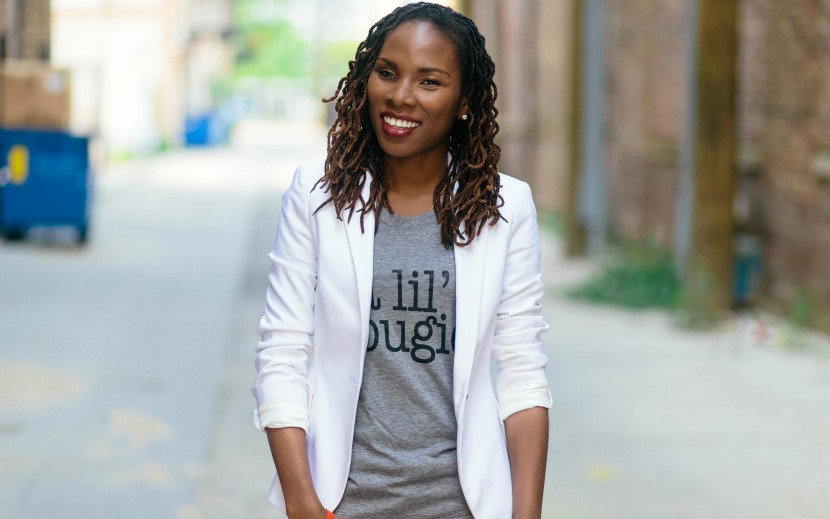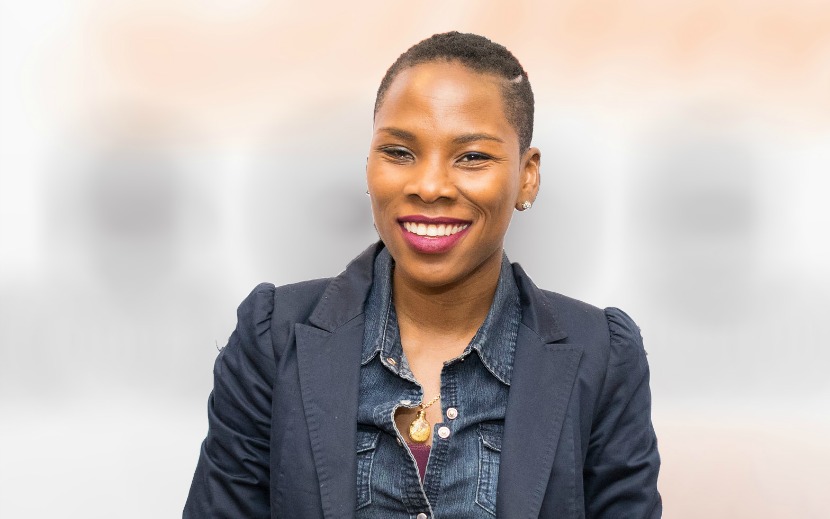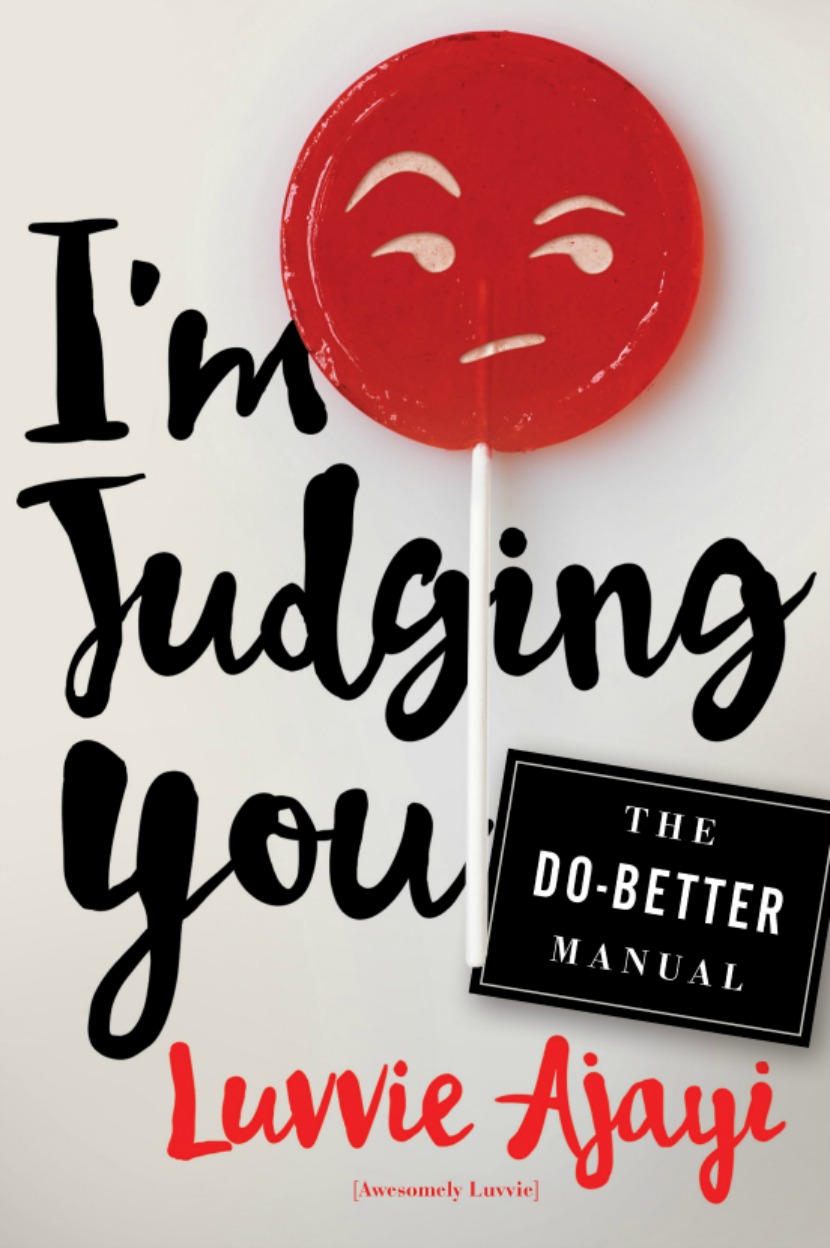Luvvie Ajayi On Resilience, Race, And Throwing Shade Like A Yoruba Lady

Luvvie Ajayi, author of the New York Times bestseller I’m Judging You: The Do Better Manual is a Nigerian-American Mash-Up, pop culture critic, humorist, digital strategist, and the creator and wordsmith behind AwesomelyLuvvie.com, her long-standing and hugely popular blog. She was also recently anointed a Super Soul by Mother Oprah for using her writing as a form of service — por ejemplo, her recent piece on anti-racist activism, “Another Day, Another Hashtag.” She sat down with The Mash-Up Americans to talk about her immigrating from Nigeria, bad behavior on the internet, resilience, and why real Gs should move in silence. Just like lasagna.
Luvvie, how do you mash up?
I’m a Nigerian, American, Black, African-American, Nigerian-American woman. I’m an immigrant to the U.S. We came over from Nigeria in ’94, when I was nine. My sister was about to start college and my mom didn’t want her to go to college in Nigeria because there was too much unrest at that moment. So we came here. Nobody told me we were immigrating. I thought we were going on vacation! We moved to Chicago, which is home. I’m a Northsider through and through.

What were your first impressions of America?
First of all, it was cold. I was coming from 90 degrees to having to wear sweaters and a jacket. That, and the culture shock of being the default in Nigeria, to coming here and being a minority.
That must have been so crazy.
I’d never even been the new girl. Then I walked into the class on the first day of school and I had a moment like, do I introduce myself with my given name, Ifeoluwa? Names are incredibly important in Yoruba culture. Or a nickname? I didn’t want to stand out even more than I already did, because I came to the U.S. with an accent and spoke differently than everybody else. I went with a nickname.
Did you have a stinky lunch, too?
Oh yeah. Lunch was jollof rice, of course.
It’s so tough for a kid in that position. But it also builds so much resilience.
I lost my accent by mimicking my classmates.
It’s a journey. Whatever I felt were struggles then were really lessons to help me grow into who I am now. I taught myself how to lose my accent by mimicking how my classmates spoke. When you’re younger, you don’t think standing out is okay, you want to be just like everyone else. But then when you’re older, you realize that what makes you stand out is what makes you cool. So you’re more up to the challenge of saying, yes I stand out and own it. That’s something that has to happen over some years.
What advice would you give to a Mash-Up that’s struggling with being an outsider?
Remember that everybody’s different in some way. Just some of us hide it better than others! And truly, having culture that’s so strong that it shows up in your accent is a gift. Having roots that you can trace back 200 years is a gift.
Do you remember the first time you saw yourself reflected in American media?
No, because oddly enough, ‘90s television had a lot of shows that reflected me in that moment. I could watch Martin, Fresh Prince of Bel Air, Family Matters. I didn’t have to go seeking it.
You’ve written a bit about being African and becoming a part of the Black American community. When did that transformation happen for you?
I never identified as Black in Nigeria, because everyone there is Black.
Probably college. I never identified as Black in Nigeria, because everyone there is Black or brown. I only started identifying as Black in the U.S. The difference between me and a lot of Nigerians and Africans that don’t necessarily identify as Black Americans is that they don’t spend their formative years here. They don’t get to be in the spaces that speak to the experience of Black Americans. College was where I started to understand race and race relations in the U.S. It was an important time of my life to learn and relearn and change my ideas.
Let’s talk about your book, “I’m Judging You.” What was the genesis?
I was ranting on Twitter about some “journalist” plagiarizing my writing and not apologizing for it. And I tweeted, “Did some of us not getting the limited edition handbook that instructs people on how not to suck?” And then I had like a cartoon lightbulb go on over my head and was like, that’s the book I’m supposed to write.

What do you judge most hard?
There is no one thing, but consistently people are terrible at othering each other about our differences and not accepting people for who they are. Like, people who just don’t like gay people because of who they love confuse me. Because if you’re not gay, then don’t be gay. Why does someone else’s gaydom affect your life? Does your own life bill go up? Like the fact that gay marriage was part of the public sphere is absurd to me.
Right. You want to be on the right side of history of this one.
And the right side of history is the one with common sense.
You write that you learned to throw shade from your mom. How do you tell someone off in Yoruba?
Oh, I can’t even go there. Yorubas don’t swear or throw shade with like an F you. Yorubas swear in metaphor.
Is there anything that you have misjudged and later you were like, Uhoh. I was wrong on that one.
A couple months ago I was mad because everybody was using Facebook Live. I was like whyyyyyy, get off Facebook Live, you’re boring! But then the Philando Castile shooting happened, and I was like, ok. I see the value here.
You have been very vocal in speaking out against police violence and white supremacy. How obligated do you feel to speak? Do you feel the weight of representing your community in these situations?
I think that’s two separate questions. One, do I feel like I should speak up on situations of injustice? I should. If I have a platform that I’m not using for anything but my own betterment, that’s incredibly selfish. Now, it doesn’t mean that I have to speak out on every single issue that is wrong. I pick and choose. But overall, I can’t be known as the influencer who was quiet just because that’s “not my brand.”
Do I feel like I’m speaking for all Black and brown people? No, I’m speaking for myself. I do keep in mind that many of my followers are people of different colors and backgrounds, so my perspective might be considered representative of the larger community, but I don’t purport that it is. But these are occupational hazards. Every job has its cons. Maybe as a person of influence, the con is that you have the burden of speaking up for people who are less fortunate than you.
That doesn’t sound too bad.
Some people’s hazards are if you move too quick your finger could get sliced off. Ours is that you should speak up for things that are hurting other people. I think we might be winning there!
What is your biggest social media pet peeve?
I think real Gs should move in silence, as preached by Lil Wayne. Everything should not be for public consumption. I never talk about my love life.
Do you ever get FOMO?
You can have FOMO for as long as the day is long.
Sometimes. Like I’ll get FOMO if I see all my friends went to a conference that I didn’t go to; but I know the reason I didn’t go was I was so freaking tired that it was the best thing for me not to go. You can have FOMO for as long as the day is long. But you need to know what your own core values are, and not let social media tell you what they are. People should inspire you, but you can’t compare what you’re doing to everything that everyone else is doing. Because you’ll start thinking that you’re not enough.
Who inspires you?
I’m inspired by a lot of my peers. Franchesca Ramsey, Issa Rae. And of course stars like Ava Duvernay, who is brilliant in everything she does, and Shonda Rhimes, who I call my fairy baemother. I’m inspired by women who create amazing things and do amazing work.
What is your number one rule of thumb for not being an idiot on the internet?
Don’t say or post anything on the internet that you wouldn’t want to be on a giant billboard in Times Square. Pictures, statuses, messages — if you don’t want this on a giant billboard in Times Square, do not pass it on via the internet. You’ll govern yourself a lot better than you probably do now.
We’re always amazed at what people think IS okay to say out loud, much less have on a billboard. Like, you don’t get to make that joke!
It’s all about your in group. You can talk about your parents but nobody else can talk about your parents! Black people can talk about Black people but other people talk about Black people and it’s sorta racist. If you’re a part of a tribe, the language you use can be different. But if someone from the outside does it, it adds a layer of context and power that can be abusive. People always use the guise of comedy to be assholes, but comedy can only protect you for so long. Sometimes you’re just an asshole.
Is there any topic that feels forbidden to you?
No, because any topic can be explored and discussed. And finding common ground on the most sensitive topic is a great moment.
That’s something that you and the LuvvNation, the incredible community you’ve built, do really well. Your audience is remarkably open.
Your audience is a reflection of you. That doesn’t mean a reflection of what you look like, but of the way you think and the way you look at the world and how you approach the world. Maybe one half of my audience is Black women, and the other half is everybody else. Nowadays, I can be a little bit more strategic about what works with my audience, but in the beginning, I was just myself. And it brought people who were like-minded to me. It also brought people who weren’t like-minded to me, who then became like-minded because they participated in my work.
I’ve had white women write to me and say that I’ve changed their mind about how they think about race. I’ve changed their life and their perspective. For me that’s the point of all of this. Are we going to always preach to the choir? No. If we can change hearts and minds, and get people to actually look within and discover how they can do and be better, I think that’s dope.
Luvvie, your life is dope and you are most certainly doing dope shit. Keep preaching!
If you dig this interview, we think you’ll love these:
Anna Holmes: Somebody Say Something About A Race War?
Ashok Kondabolu On Das Racist, Dosas, And Dating While Indian
Chino: On Empanadas And Hip Hop



![[Image Description: Photo of a Latinx man in the middle of a performance. He is shirtless and has a green pair of mesh underwear over his face as he looks down towards the ground. Bright pink and yellow pieces of fabric are wrapped around his arms. In the background are two other performers, one sitting on the ground and one on all fours. Behind them are seated audience members observing the performance. There is fabric and other items strewn across the performance space floor.] Photo Credit: Ian Douglas](https://www.mashupamericans.com/wp-content/uploads/2021/03/MiguelGutierrez_031921_EDITED_1_CREDIT-IAN-DOUGLAS-248x194.jpg)

